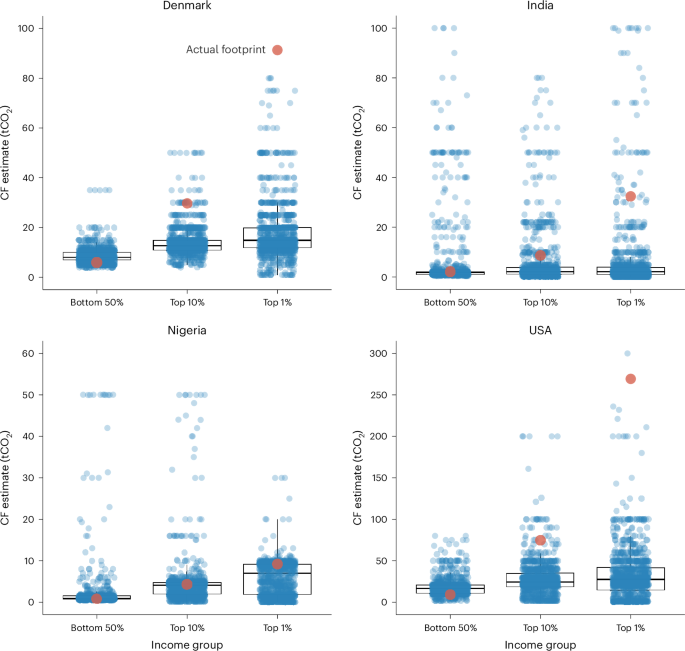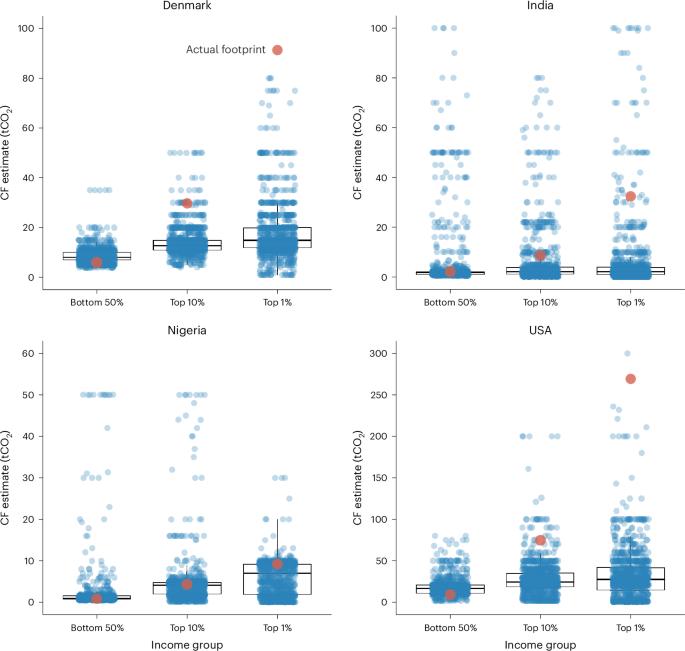低估四个不同国家的个人碳足迹不平等现象
IF 29.6
1区 地球科学
Q1 ENVIRONMENTAL SCIENCES
引用次数: 0
摘要
大量研究表明,全球和国家内部在个人碳足迹方面存在不平等。然而,人们对这些不平等现象的认识程度仍不清楚。在这里,我们使用了一项分布在四个不同国家的在线调查:在此,我们通过一项分布于丹麦、印度、尼日利亚和美国四个不同国家的在线调查,显示出人们普遍低估了碳足迹的不平等,而与参与者所在的国家和收入阶层无关。在每个国家的 4,003 名参与者中,50% 的参与者来自收入最高的 10%。我们的研究结果表明,碳足迹不平等认知与气候政策支持之间存在联系,但在四个国家和参与者的收入阶层之间存在显著差异。此外,实际碳足迹不平等的公平感也存在联系,这突出表明有必要提高人们对碳足迹不平等的认识,并进一步解读其对气候正义和政策的影响。本文章由计算机程序翻译,如有差异,请以英文原文为准。


Underestimation of personal carbon footprint inequality in four diverse countries
Extensive research highlights global and within-country inequality in personal carbon footprints. However, the extent to which people are aware of these inequalities remains unclear. Here we use an online survey distributed across four diverse countries: Denmark, India, Nigeria and the USA, to show widespread underestimation of carbon footprint inequality, irrespective of participants’ country and income segment. Of the 4,003 participants, within each country, 50% of participants were sampled from the top 10% income group. Our results show links between carbon footprint inequality perceptions and climate policy support, but with significant variations observed across the four countries and with participants’ income segments. Furthermore, there are links to the perceived fairness of actual carbon footprint inequality, highlighting the need to raise awareness about carbon footprint inequality and further unpack its implications for climate justice and policy. Existing studies show carbon footprint inequality between and within countries, but awareness of this inequality is unclear. This study finds widespread underestimation of carbon footprint inequality and its associations with climate policy support and perceived fairness.
求助全文
通过发布文献求助,成功后即可免费获取论文全文。
去求助
来源期刊

Nature Climate Change
ENVIRONMENTAL SCIENCES-METEOROLOGY & ATMOSPHERIC SCIENCES
CiteScore
40.30
自引率
1.60%
发文量
267
审稿时长
4-8 weeks
期刊介绍:
Nature Climate Change is dedicated to addressing the scientific challenge of understanding Earth's changing climate and its societal implications. As a monthly journal, it publishes significant and cutting-edge research on the nature, causes, and impacts of global climate change, as well as its implications for the economy, policy, and the world at large.
The journal publishes original research spanning the natural and social sciences, synthesizing interdisciplinary research to provide a comprehensive understanding of climate change. It upholds the high standards set by all Nature-branded journals, ensuring top-tier original research through a fair and rigorous review process, broad readership access, high standards of copy editing and production, rapid publication, and independence from academic societies and other vested interests.
Nature Climate Change serves as a platform for discussion among experts, publishing opinion, analysis, and review articles. It also features Research Highlights to highlight important developments in the field and original reporting from renowned science journalists in the form of feature articles.
Topics covered in the journal include adaptation, atmospheric science, ecology, economics, energy, impacts and vulnerability, mitigation, oceanography, policy, sociology, and sustainability, among others.
 求助内容:
求助内容: 应助结果提醒方式:
应助结果提醒方式:


